
With Resonance, Tenor Michael Fabiano Sees Thousands of Hours of Hard Work Come to Fruition
By David SalazarFive years ago, tenor Michael Fabiano embarked on a business venture to create an app designed to help artists find work.
According to Fabiano, he worked on the technology with several engineers for 40-50 hours a week throughout 2014-15, all while balancing a career as one of the world’s burgeoning opera stars.
The app never came to fruition.
“Because I was a novice, had a coding problem, not enough engineers, and engineers didn’t work fast enough,” Fabiano noted in a recent chat with OperaWire. The tenor shared that he had invested hundreds of thousands of dollars of his wealth into making the project a reality. “It was ready to launch, but engineers wanted more money and I hadn’t secured enough capital to continue.”
He felt that it was simply too risky to move forward. Consequently, he put the project “on ice.”
He moved on to create what is now the tremendously successful “ArtSmart” and has continued his ascent into operatic superstardom.
But that project, which was under the company name “Trengo,” remained in his mind. He wanted to see it succeed.
Fast forward to 2020 and that vision has become a reality through an application called Resonance.
In 2019, Fabiano was approached by Ray Geis, Sean Christensen, and Sushanth David. The team had developed Appcompanist, a mobile app that gave artists a virtual accompanist for practicing or, in the COVID-19 world, performing needs. In 2018, the trio had moved forward with technology that was similar to what Fabiano had been doing with “Trengo.”
Their project was already in development, but when the three heard about Fabiano’s app aspirations, they considered the star tenor an ideal partner.
“This is what I did in 2014 for thousands of hours and to know that another team was able to manage to get it to the point I couldn’t is a huge plus for me personally,” Fabiano noted. “It affirms that what I was doing was correct. I was just a little early and I was spread thin. But all of my hard work is going to see the light of day finally.”
Resonance, which is now live, allows users to create their own customizable profiles that enable them to interact with other users. Fabiano described its approach as being in the same vein as LinkedIn.
“That’s how we built it. If you start to use it, we have tons of specializations and ways to validate if an artist is qualified in, for example, French diction. Many people can say, ‘Yes, I affirm that this person is qualified in French diction, or whatever it is.’”
At the outset, the idea is for coaches, teachers, and artists to streamline their lives, book appointments, get seen by the community, get hired, and “get paid immediately.”
Fabiano noted that the booking engine is very much based on the Airbnb Theory.
“The Provider says that they are available for these times and any artist can book a time based on that schedule. It can be confirmed, denied, negotiated,” Fabiano noted. “Payments are guaranteed. If a student cancels on a coach or teacher last minute, we make sure that the coach or teacher still gets paid.”
The company then charges a fee per appointment via Stripe. At the end of the year, the company automatically generates a 1099.
He also noted that the company uses blockchain technology to create smart contracts.
“For example, let’s say a church needs a singer on Sunday to do a certain project. A contract is automatically generated,” Fabiano noted.
Another feature of the app is that it includes video technology that allows people to connect for virtual appointments, lessons, and even concerts.
While the focus, for the time being, is on teaching and masterclasses now, Fabiano noted that the organization has “an exhaustive list of presenters that we will be marketing and working with. Anything down to bars and lounges to smaller presenters; we have the ability to organize events. The app is customizable. The organization can source talent for a concert.”
Of course, this kind of direction would bring up the question of how artists’ relationships with their managers are affected. If artists can directly communicate with presenters, then where does the manager fit in?
Fabiano doesn’t see this as an issue for several reasons.
“There are instances where artists don’t have a manager or don’t have the fortune of having a manager like my own. Or perhaps they have a manager that doesn’t have the bandwidth to work on certain projects. For example, the manager might not organize certain events or concerts,” he noted. “At this point in our national world history, any tool that an artist can have to monetize their life and affirm the dignity of their hard work is a tool they should have.
“We know many artists struggle to be seen. I didn’t get seen until I was 26. Had I possessed a tool like this when I was 23, when I was going on Craigslist looking for funeral and weddings to make 50 bucks, this would have made my life wonderful.”
Fabiano recently launched his own masterclass series and is requiring all participants to sign up for Resonance. He noted that several notable artists like Nadine Sierra and Latonia Moore, among many others, will also be employing the tool for similar projects and purposes.
“I want every person who participates to have a profile with Resonance so they can understand that there is a tool out there that can improve their artistic livelihoods,” he concluded. “I want people to have a better shot at making money. And the answer is using Resonance.”


